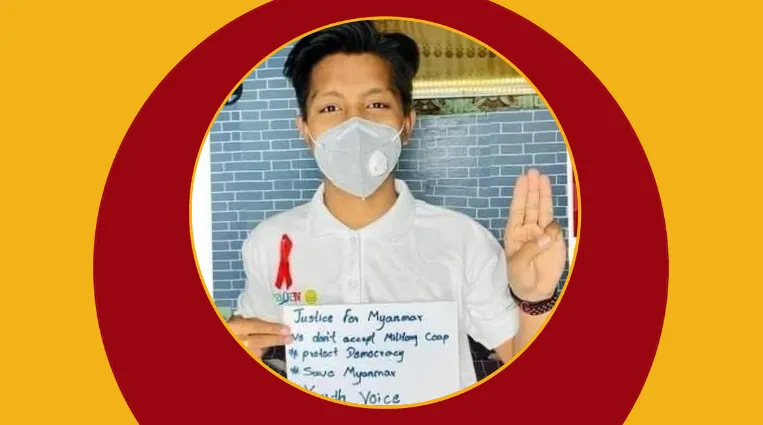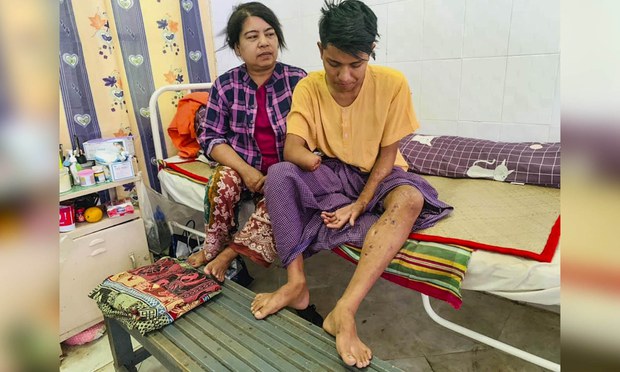Myanmar’s Youth Lose Their Dreams for the Future Amid Junta Crackdowns
28 May 2021

Many have been killed during protests or in custody, with others crippled by torture after their arrest.

Hlyan Phyo Aung, a university student from Myanmar’s Magway city, lost his right hand and vision in one eye after his arrest in an anti-junta protest on March 27, 2021. (Citizen Journalist)
By RFA
Myanmar’s youth are being forced to give up their dreams of careers and a productive future as they resist an assault by the military on their country’s democracy and crackdowns on protests that have crippled thousands of civilians and killed hundreds, sources say.
Among those killed, Nyi Nyi Aung Htet Naing, 23, was shot dead by junta forces in the Hledan suburb of Yangon city on Feb. 28, his twin Koko Aung Htet Naing told RFA’s Myanmar Service, adding that his brother had once dreamed of becoming a network engineer.
“I haven’t watched the video of my brother’s death in Hledan yet because I don’t have the strength to do it,” Koko Aung Htet Naing said. “As his twin brother, I don’t want to know or see how he died, or how much he may have suffered. I don’t want to feel the emptiness in my heart.”
Nyi Nyi Aung Htet Naing was only one of the many young people killed in the early days of protests calling for Myanmar’s return to democracy after the Feb. 1 military coup that ousted the elected civilian government of Aung San Suu Kyi and her National League for Democracy (NLD) party.
Like others, he had dreams for his future, his brother said.
“He wanted to pursue advanced studies in the field of network engineering at some point, and he wanted to study abroad,” Koko Aung Htet Naing said, adding, “But his dreams were just dreams. Those dreams will never come true now.”
“This was a huge loss for me,” he brother said.
Other protesters in the anti-dictatorship movement, now commonly called the Spring Revolution, have also seen their futures destroyed following arrest and torture by junta forces, other sources told RFA.
Hlyan Phyo Aung, a 22-year-old student from Myanmar’s Magway city, suffered gunshot wounds to his right arm, which was later amputated above the wrist, during a protest rally on March 27, and is losing vision in one eye.
He has trouble now performing simple tasks, he said.
“In my imagination, I still think [my hand] is there. I think that I can curl up my fingers, but they’re not there anymore,” he said, adding, “Sometimes when I go to sleep at night I feel so sad: ‘Oh, my hand is gone?’ But during the operation, I didn’t even cry.”
An engineering student who had excelled in architecture, Hlyan Phyo Aung has now lost his dream of designing buildings, he said.
“I got the highest marks in my school in drawing and my major subjects, but now all I have left is charity work,” he said. “And not all the fingers on my left hand are good now, either. They stepped on my fingers and crushed my middle finger when they took off my ring.”
“Also, my eyes need an operation, as I can’t bear the light. It’s not okay to see only with one eye,” he added.
Hlyan Phyo Aung is currently being treated at a military hospital for rubber-bullet wounds to his arms and legs, and is facing charges of incitement to riot under Article 505(a) of Myanmar’s Penal Code, he said.
The Thailand-based rights group Assistance Association for Political Prisoners (AAPP) says that more than 4,300 people, most of them young, have been arrested in Myanmar since the military coup. Many have gone missing for months following their arrest, and some have been killed in custody with their bodies returned afterward to their families.
Others have escaped arrest and fled to areas outside of government control.
‘Things like in the past’
One, 19 years old, had planned to start a graphic design business when the military launched its coup, the young man said, speaking on condition of anonymity.
“As a young person, my work is in social media, and I had planned to start my own company in six months. But now because of all the oppression I won’t be able to do that” he said.
“Things are now going to be like they were in the past when you had to fear even the tenth cousin of a senior military officer,” he said.
Though his future goals in life are unclear, his plans now are to fight against Myanmar’s military dictatorship to protect the country’s younger generation from suffering under oppression, he said.
Many of Myanmar’s most talented youth had big hopes before the coup, but now those hopes are gone, said Moe Thway, chairman of the pro-democracy youth movement Generation Wave. “Youths with all their dreams have turned to taking up arms without ever having wanted to,” he said.
“Myanmar has returned to military rule under which the army oppresses, tortures, and kills people,” he said, adding that international sanctions have been imposed to punish Myanmar’s ruling generals, and that some international companies have left the country.
“So we have lost a lot of business and educational opportunities,” he said. “In fact, we can say that the future of the country’s youth is uncertain and quickly disappearing.”
An activist who had been involved in earlier protest movements—the 1988 Democracy Movement, the 1996 student strike, and the 2007 Saffron Monk Uprising—expressed sorrow that now another generation of the country’s youth has been thrown into the fight in Myanmar for democracy and human rights.
“In the past, they only heard about the oppression, threats, brutal arrests, torture, and killings,” she said. “But now Generation Z is seeing all these things for real.”
“And while they face the prospect of arrests and of having no future, they are trying to win the Spring Revolution from wherever they are,” she said.
Reported by July Myo for RFA’s Myanmar Service. Translated by Khin Maung Nyane. Written in English by Richard Finney.
Original Post: RFA
Announcements
28 February 2025
Asian NGO Network on National Human Rights Institutions , CSO Working Group on Independent National Human Rights Institution (Burma/Myanmar)
Open letter: Removal of the membership of the dis-accredited Myanmar National Human Rights Commission from the Southeast Asia National Human Rights Institution Forum

Progressive Voice is a participatory rights-based policy research and advocacy organization rooted in civil society, that maintains strong networks and relationships with grassroots organizations and community-based organizations throughout Myanmar. It acts as a bridge to the international community and international policymakers by amplifying voices from the ground, and advocating for a rights-based policy narrative.